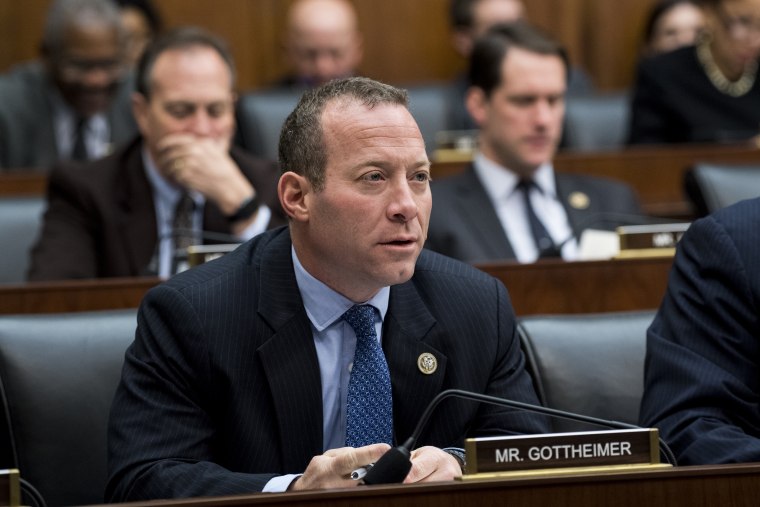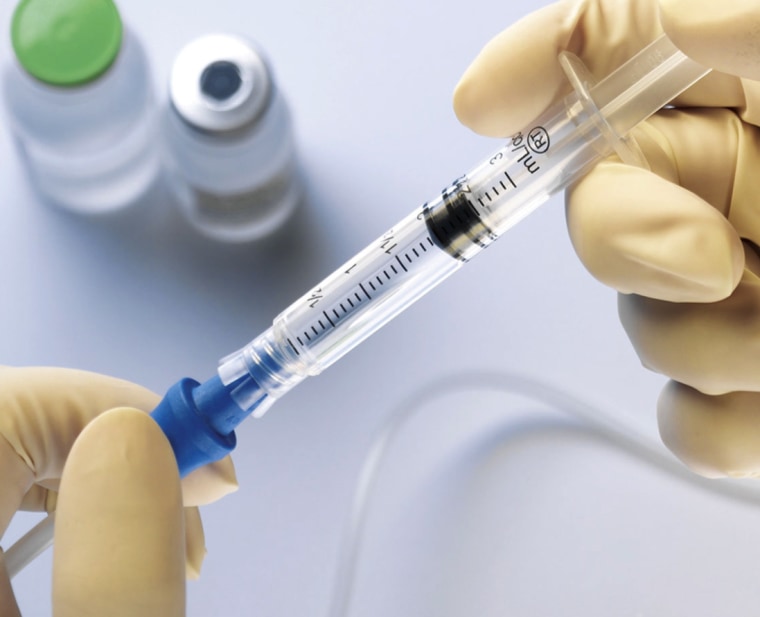WASHINGTON — The federal coronavirus response created a reversal of fortune for Retractable Technologies Inc., a small syringe manufacturing company overlooking Lewisville Lake on the northern edge of suburban Dallas.
In late March, the Department of Health and Human Services began drafting an $83.8 million order for RTI to produce the lion's share of roughly 330 million needles and syringes for a future COVID-19 mass vaccination campaign. That coincided with private business brisk enough for the company to report a 41.8 percent increase in first-quarter sales compared with the same period in 2019, according to one of its filings with the Securities and Exchange Commission.
But despite its good fortune, a few weeks later, on April 17, RTI secured a $1.4 million hardship loan under the Paycheck Protection Program, or PPP. That's the program Congress set up to offset the economic impact of the coronavirus pandemic by giving cash-strapped small businesses enough money to keep workers on the payroll while commerce slowed. On May 1, the nearly $84 million government contract came through.
During those months of good news, RTI's stock price surged, moving from $1.53 per share on Jan. 2 to $7.38 per share by the close of business on June 19. One of the biggest beneficiaries of the 382 percent spike was Renaissance Technologies, a hedge fund that held more than 1.2 million shares of RTI as of March 30.
Full coverage of the coronavirus outbreak
How did RTI get both a government hardship loan and a big federal contract virtually at the same time? It's not clear whether Renaissance's interest had any role in the government's support of RTI, but the hedge fund's longtime co-CEO Robert Mercer, who stepped back from that role in 2017, has been one of President Donald Trump's top backers. A lobbyist for Renaissance didn't reply to an emailed question about whether the company played a role in the deal.

RTI's taxpayer-backed windfall has raised eyebrows among industry insiders and lawmakers who questioned how the company could be both a struggling small business and a bustling manufacturer able to produce needles and syringes by the hundreds of millions. And the company's filings with the SEC portray the contract as both a boon for business and a burden it might not be able to carry.
"We simply can't afford to be unprepared when a vaccine is ready," said Rep. Josh Gottheimer, D-N.J., whose district includes Becton Dickinson and Co. of Franklin Lakes, the largest needle and syringe manufacturer in the country. "The administration gave a multimillion-dollar contract to a business who can't produce the necessary supplies — and who, simultaneously, received a PPP loan. It's left a lot of us scratching our heads."
RTI officials didn't respond to emailed questions or a voicemail message left for its spokesman, but its federal disclosures reveal ambivalence about the deal.
"[O]ur material $83.8 million delivery order from the United States government presents unusual challenges for our business," the company wrote in a filing for the quarter that ended March 31. "Our performance may not be realized if we cannot timely and adequately increase domestic and foreign production. Moreover, in light of such volume requirements, we may not be able to maintain our usual service levels to our existing customers."
But RTI also told regulators that the contract means it will be expanding.
"The order placed on May 1, 2020 is unusually significant to the Company," RTI wrote in the same filing. "The Company expects to increase both domestic and foreign production and add additional personnel in response to this material delivery order."
In other words, RTI is hiring workers, not firing them, after having made a good-faith certification that "current economic uncertainty makes this loan request necessary to support the ongoing operations" in order to get its PPP loan. It's not clear exactly when RTI filed its PPP loan paperwork, which includes the self-certification clause, but the application came sometime from March 27, when Congress created the PPP program, to April 17, when the company got the government-secured loan. The finalized government contract came May 1.
In the SEC filing, the company said that "while we cannot predict the effect of the novel coronavirus on future periods, we do not believe that the virus had a material effect on sales in the first quarter of 2020," and it added that neither its supply chain nor its work as an "essential business" had been disrupted by the pandemic.
RTI didn't reply to a request for comment about its reason for obtaining the PPP loan when business was booming or about its ability to fulfill the contract. RTI's Washington lobbyists, who were hired in March, didn't respond to requests for an interview. Winning Strategies Washington is the first influence firm retained by RTI since 2011.
The contract is worth more than double RTI's gross sales for 2019, and it is by nearly three times the largest agreement RTI had previously reached with the government, according to SEC and federal contracting records.
How taxpayers turned the company around
In January, the Biomedical Advanced Research and Development Authority, a Health and Human Services agency, reached out to manufacturers to assess their capacity and supply chain readiness, according to an HHS spokesperson.
For the next two months, Dr. Rick Bright, then the head of agency, pushed HHS and White House officials to begin ordering as many as 850 million needles and syringes out of concern that there would be a shortage, according to a whistleblower complaint he filed. Bright alleges that he was removed from his post as retribution for clashing with superiors over the government's COVID-19 response.
But his complaint shows that he found an ally of sorts in Peter Navarro, who is in charge of domestic manufacturing for the White House coronavirus task force, to discuss potential shortages of needles, syringes, personal protective equipment and other supplies.
"We may find ourselves in a situation where we have enough vaccine but no way to deliver all of it," Navarro wrote Feb. 14 in a memo to the task force, in which he advocated for Bright's argument in favor of ordering needles and syringes and increasing manufacturing capacity.
On March 23, HHS began modifying existing deals with RTI, Becton Dickinson and Marathon Medical of Aurora, Colorado, to facilitate ordering needles and syringes. The tweaks invoked parts of the Defense Production Act. Two days later, the revisions were withdrawn — but not before they had been noticed publicly.
Then, on May 1, the plan was revised and deals were awarded to RTI and Marathon, according to federal contracting records.
Marathon's deal is worth $27.4 million, and a second HHS spokesperson said by email that the total government order of roughly 330 million needle-and-syringe units includes 50 million that Becton Dickinson is expected to produce at a cost of $11 million. But Becton Dickinson, which has about 80 percent of the domestic market share for needles and syringes, according to industry experts, said it is still in negotiations with the government.
"We don't have anything finalized yet," Becton Dickinson spokesperson Troy Kirkpatrick said in a telephone interview.
Download the NBC News app for full coverage and alerts about the coronavirus outbreak
Industry insiders said there's little doubt Becton Dickinson could ramp up its production to meet the government's needs, while RTI doesn't have the same track record.
In its most recent annual report, filed in March, RTI said its competitiveness is limited by the capabilities of companies with larger market shares, including Becton Dickinson specifically.
"BD and Medtronic have controlling U.S. market share; greater financial resources; larger and more established sales, marketing, and distribution organizations; and greater market influence, including long-term and/or exclusive contracts," the company wrote. "Additionally, BD may be able to use its resources to improve its products through research or acquisitions or develop new products which may compete with our products."
The second HHS spokesperson said the government was eyeing a smaller deal for BD because of its "available capacity."
The second HHS spokesperson said federal officials wanted to obtain needles and syringes for COVID-19 use without disrupting the supply needed to deal with vaccinations for other diseases. They are still trying to acquire more needles and syringes and ramp up domestic production, the spokesperson said.
On May 7, high-ranking officials at HHS and the Federal Emergency Management Agency agreed to seek powers under the Defense Production Act that would allow RTI to prioritize the government's order and force its suppliers to do the same, according to an internal document obtained by NBC News. The Defense Production Act also protects companies from exposure to lawsuits from customers that get pushed back in line by the federal order.
Aside from the question of whether RTI was the best pick to ensure that the public can get a vaccine if one is developed, it isn't clear why a company with surging sales and a major government contract needs a $1.4 million PPP loan. As long as RTI meets basic criteria by keeping its workforce intact, the loan will be forgiven, translating to free cash from taxpayers.
The company also didn't respond to questions about its interactions with the government regarding the contract and whether it anticipates that its loan will be forgiven under the Small Business Administration's PPP rules. A spokesperson for the White House coronavirus task force declined to comment on whether the White House influenced the award of the contract.
Caroline Bruckner, an expert on small business at American University's Kogod Tax Policy Center, said there could have been a legitimate need for the PPP loan. But, she added, the absence of transparency in the program means it's harder for the public to know. The government hasn't released a list of recipients, and eligibility for loans was determined on an honor system of self-certification.
"This is exactly what appropriate oversight would investigate," Bruckner said.
Stephanie Ruhle reported from New York, and Jonathan Allen reported from Washington.


